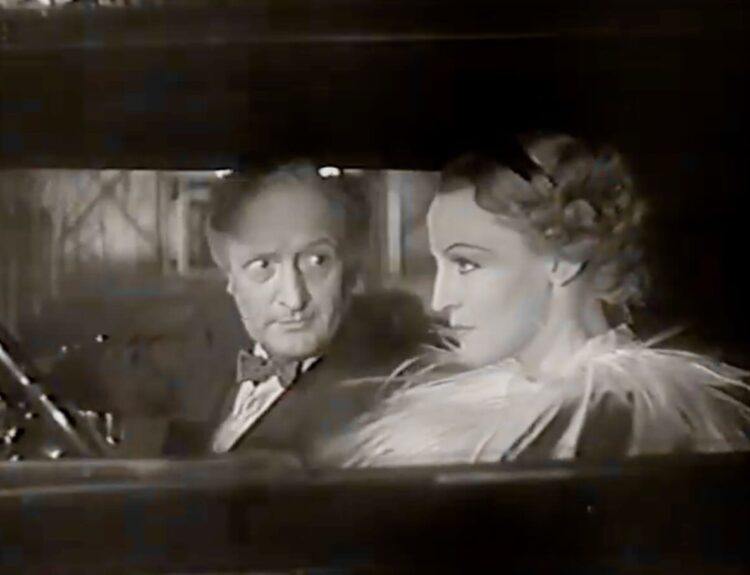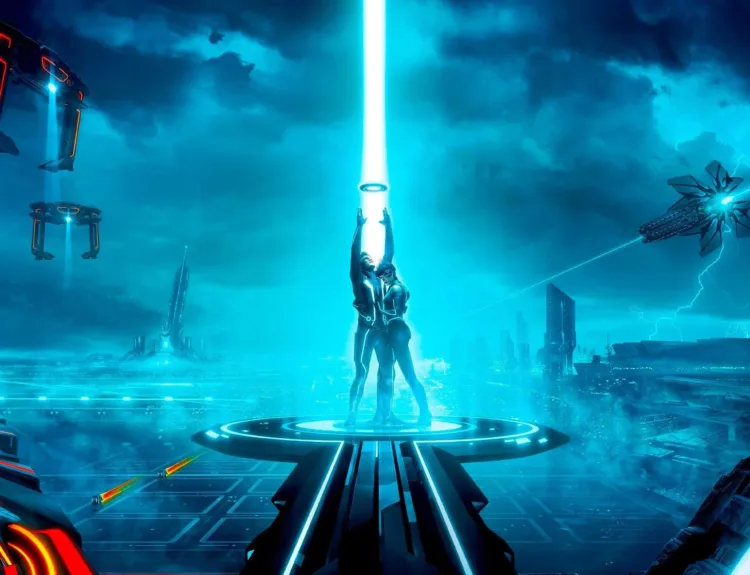As mentioned previously, in “Impossible Voyages” I’m watching and writing about a run of new (to me) science fiction films to be watched over this year (and possibly beyond). You can read the rationale and ground rules here. In the meantime, we are advancing from 1930 to 1932 with this movie, #11 in this series.
I had a lot of difficulty picking the next film for this series. The only real option available to me from 1931 was Dr. Jekyll and Mr. Hyde, which I’m sure is a good film but having watched the 1920 version not long ago, I wasn’t excited about it. I tried to watch L’Atlantide from 1932, but found it incredibly tedious and difficulty to get into, and also the science fiction elements seemed pretty thin. But then I discovered this little gem, another movie from 1932 that I had a great time with.
Spoilers Ahead

Chandu the Magician (1932)
Directed by William Cameron Menzies and Marcel Varnel
The Story: Frank Chandler returns from years of study in India, where he has learned eastern magic and gained powers such as teleportation, telekinesis, and mesmerism. He has been given the new name “Chandu” and tasked with using his powers to combat evil. He pursues a mad villain, Roxor, who has kidnapped Chandu’s brother-in-law Robert in order to steal from him the secrets of the death ray he has been developing. After many perils, Chandu rescues his family (endangered by Roxor), defeats the villain, and is reunited with his former love, Princess Nadji of Egypt.
Starring: Edmund Lowe as Frank Chandler aka Chandu, Béla Lugosi as Roxor, and Irene Ware as Princess Nadji. Virginia Hammond, Henry B. Walthall, June Vlasek (aka June Lang) and Nestor Aber (aka Michael Stuart) play Chandu’s sister, brother-in-law, niece and nephew. Herbert Mundi is Albert Miggles, Chandu’s comical servant, Welden Rayburn is Abdullah, a secondary antagonist who is obsessed with Princess Nadji, and Nigel De Brulier is Chandu’s teacher.

Comments: In the future, if I ever seen an old movie that I think is slow and plodding, and I’m tempted to excuse it those faults because it’s old and that’s how they did things back then, I’ll have to remember Chandu the Magician, because this turns out to be one the most tightly-paced movies of its sort that I have ever seen. Based on a old radio serial that was then ongoing, the movie is jam-packed with all sorts of cool pulp-adventure elements–we’ve got over-the-top villains, noble heroes, magic powers, killer death rays, terrible peril, and daring rescues. There is comedy, romance, drama and high-stakes action. It’s pretty much everything you’d ever want from one of those old movie serials, except that it clocks in at just over 70 minutes! Nothing is padded, but also nothing is rushed. The film introduces and develops its various characters and concepts just as it needs to. It just goes to show that a story doesn’t have to be long to feel full.
Chandu the Magician also boasts some really good production design and special effects. The magical feats are accomplished through effective trick photography / editing, and the sci-fi trappings of the death ray look really good. On pretty much every technical level, the movie works–it’s got good production design, set, costumes, and cinematography.

What the movie doesn’t have, you probably will not be surprised to hear, is much going on in the way of cultural sensitivity. Though the Egyptian and Indian characters are a mixture of positive and negative (there are both good guys and bad guys), it’s no doubt the depictions are “outdated” by any modern standard, with its magical yogis and slave-trading middle eastern and so on. And so your mileage may vary in terms of enjoyment of the film, depending on how frustrating this is for you. Obviously, I still found plenty to enjoy.
Not that I’d say it’s the sort of thing one should take seriously. No, this is a movie for kids, or at least, that is made to be enjoyed with child-like sensibilities. Frank Chandler is basically a superhero in the mood of Dr. Strange–a Westerner who has learned magic powers, and now must use them to “conquer the evil that threatens mankind.”

He is tasked specifically to face the mad Roxor, who is determined to steal death ray technology and use it for…well, presumably specifically what it was created for: to dole out death on a massive scale. (The rationale for why seemingly good-guy scientist Robert Regent, aka Chandu’s brother-in-law, has spent his lifetime developing this thing is never explored).
Chandu’s unnamed yogi teacher tells him that it is fate that has chosen him for this task and “because no man fights so well as when he is protecting his loved ones, fate has thrown thine own family in the path of this inhuman monster.”

So fate purposely endangered Chandu’s family so that he would fight better? Man, fate is a jerk!
The legendary Bela Lugosi plays Roxor with unrestrained madness. He doesn’t have a moustache to twirl, but he does not leave a scrap of scenery unchewed. He’s raging and over-the-top and gleefully evil. But he’s also full of personality and even some nuance, such as when he almost lets Chandu goad him into a losing battle by appealing to his pride and superiority. The sequence where he threatens Regent’s family with the deathtrap of the prison cell whose floor opens into a giant trap door is particularly fun.

The rest of the cast is fine for this type of film, though nobody holds a candle to Lugosi. Perhaps the most grounded performance comes from Irene Ware as Princess Nadji–she’s not exactly a progressive character, but I liked her overall, and she acquits herself reasonably well for a female character in this type of movie from this time period. She’s miles better than Dale Arden from the Flash Gordon serial I watched a while ago.
I also want to give a shout-out to Herbert Mundi as the comic relief character, Miggles, who probably closest to Roxor for shear on-screen personality. Miggles is a drunk who comes to work for Chandu, but gets himself cursed for his troubles so that whenever he wants to drink, a little miniature avatar of himself shows up to scold him (I’m so excited to report that I’m totally not making this up).

He’s got plenty of these little moments that are silly but well-played, and miraculously don’t derail the narrative of this short feature.
You see, this is what I mean by how well-paced this movie is. It fits in loads of ideas and tones and characters, but they all feel like they are given the right amount of time and space. It really is an impressive feat of economical storytelling that we all could learn a thing or two from. The first ten minutes alone covers everything we need to know about Chandu’s origin, his mission, the stakes, and his main enemy, and then we’re off onto the adventure.
(That adventure, by the way, turned out to be a serial-version of Chandu which brought back Lugosi as the title character, giving him the rare opportunity to play a hero. I haven’t seen–maybe I’ll watch it, but I’m concerned that the longer format will lose the pacing strengths that I really enjoyed about this movie.)

Now don’t misunderstand me–I’m not saying that Chandu the Magician is the greatest movie ever made, or the greatest science fiction movie or the best superhero film or anything like that. But so far, it is the best example of 1930s pulp-escapist entertainment that I have ever seen.



